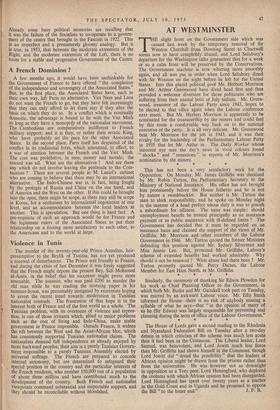AT WESTMINSTER
THE slight fever on the Government side which was caused last week by the temporary removal of Sir Winston Churchill from Downing Street to Chartwell seems now to have completely abated, and Lord Salisbury's departure for the Washington talks guarantees that for a week or so a calm front will be preserved by the Conservatives. The Government machine is now whirring more smoothly again, and all was put in order when Lord Salisbury dined with Sir Winston on the night before he left for the United States. Into this placid political pool Mr. Herbert Morrison and Mr. Arthur Greenwood have dived head first and thus provided a welcome diversion for those politicians who are suffering from their annual bout of July tedium. Mr. Green- wood, treasurer of the Labour Party since 1943, hopes to be elected to that office again when the Labour conference next meets. But Mr. Herbert Morrison is apparently to be nominated for the treasurership by the miners and could find by this route a comfortable way back on to the national executive of the party. It is all very delicate. Mr. Greenwood beat Mr. Morrison for the job in 1943, and it was their rivalry for the leadership of the Parliamentary Labour Party in 1935 that let Mr. Attlee in. The Daily Worker whose innocent eye sees the day's news in vivid colours found " shocks " and " sensations " in reports of Mr. Morrison's nomination by the miners. * * * * This has not been a very satisfactory week for the Opposition. On Monday, Mr. James Griffiths was chastised by Mr. Robin Turton, the Parliamentary Secretary to the Ministry of National Insurance. His office has not brought him prominently before the House hitherto and he is not by nature a swashbuckler. But neither is Mr. Turton the man to shirk responsibility, and he spoke on Monday night in the manner of a head prefect whose duty it was to punish a subordinate for silliness. The issue was simple: should unemployment benefit be treated principally as an insurance payment or as public assistance with ill-defined limits ? The Government has decided that it must be regarded on an insurance basis and claimed the support of the views of Mr. Griffiths, Mr. Morrison and other members of the Labour Government in 1946. Mr. Turton quoted the former Ministers defending this position against Mr. Sydney Silverman and Miss Jennie Lee. But, protested Mr. Griffiths, Labour's scheme of extended benefits had worked admirably. Why should it not be renewed ? What abuse had there been ? Mr. Turton promptly quoted Mr. Percy Daises, the Labour Member for East Ham North, at Mr. Griffiths. * * * * Similarly, the ceremony of thanking Sir Edwin Plowden for his work as Chief Planning Officer to the Government, in which both Mr. Butler and Mr. Gaitskell took part on Tuesday, was marred by an awkward Labour voice. Mr. Ellis Smith i informed the House—there is no risk of anybody missing a syllable of what he says----that " in the opinion of many of us he (Sir Edwin) was largely responsible for preventing real planning during the term of office of the Labour Government." * * * * The House of Lords gave a second reading to the Rhodesia and Nyasaland Federation Bill on Tuesday after a two-day debate in which criticism of the scheme was much less acute than it had been in the Commons. The Liberal leader, Lord Samuel, was benevolent, and Lord Jowitt much less fierce than Mr. Griffiths had shown himself in the Commons, though Lord Jowitt did " dread the possibility " that the leaders of African opinion might be drawn from the prisons rather than from the universities. He was however not so •downright in opposition as a Tory peer, Lord Hemingford, who deplored the coolness with which African opinion had been disregarded. Lord Hemingford has spent over twenty years as a teacher in the Gold Coast and in Uganda and he promised to oppose


































 Previous page
Previous page